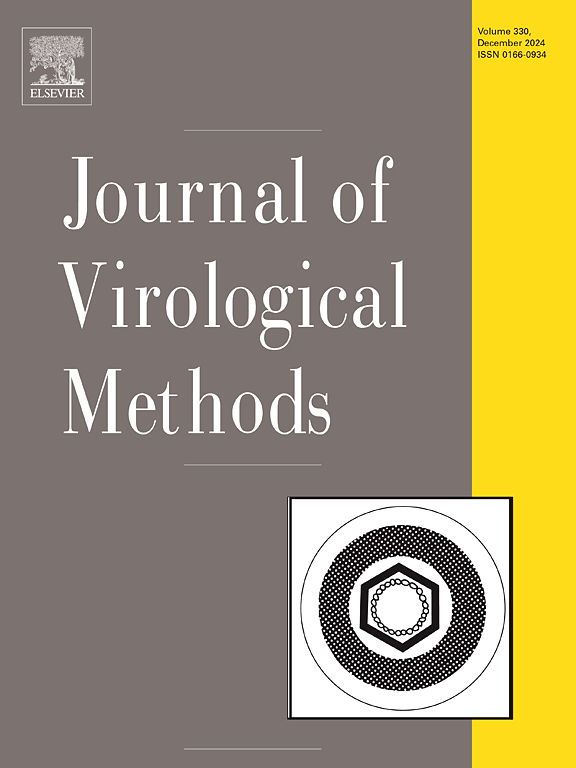IC-ELISAs for the quantitative detection of monkeypox virus cross-immunogenic modified vaccinia virus Ankara antigens L1 and A33
IF 1.6
4区 医学
Q3 BIOCHEMICAL RESEARCH METHODS
引用次数: 0
Abstract
Vaccination is always the most effective approach to control and prevent monkeypox epidemics. The efficacy testing of vaccines is an important component of vaccine quality control. Based on the 3Rs principles, measuring the content of effective proteins in vaccines to evaluate vaccine efficacy is an excellent alternative to traditional in vivo assays. In this study, we reported two indirect competitive ELISA (IC-ELISA) methods based on the use of M1- and A35-specific antibodies that recognize the L1 and A33 proteins of the modified vaccinia virus Ankara (MVA) vaccine, which are cross-immunogenic to monkeypox virus (MPXV), respectively. M1-IC-ELISA was shown to be linear over the range of 31.25–2000 ng/mL with an LOD value of 48.36 ng/mL. A35-IC-ELISA was shown to be linear over the range of 3.90–1000 ng/mL with an LOD value of 3.74 ng/mL. These two methods were found to be specific, precise, accurate and robust in the quantification of cross-immunogenic L1 and A33 in final MVA vaccine and showed a strong correlation with viral titer, MPXV cross-antibody titer and MVA neutralizing antibody titer. The developed methods may be an alternative to the in vivo assay in quality control testing of MVA vaccine.
猴痘病毒交叉免疫原性修饰痘苗病毒安卡拉抗原L1和A33的定量检测
疫苗接种始终是控制和预防猴痘流行的最有效方法。疫苗效力检测是疫苗质量控制的重要组成部分。基于3Rs原理,测量疫苗中有效蛋白的含量来评估疫苗效力是传统体内试验的一个很好的替代方法。在这项研究中,我们报道了两种间接竞争ELISA (IC-ELISA)方法,该方法基于M1-和a35特异性抗体,分别识别修饰的安卡拉牛痘病毒(MVA)疫苗的L1和A33蛋白,这两种蛋白分别对猴痘病毒(MPXV)具有交叉免疫原性。M1-IC-ELISA在31.25 ~ 2000 ng/mL范围内呈线性关系,LOD值为48.36 ng/mL。A35-IC-ELISA在3.90 ~ 1000 ng/mL范围内呈线性关系,LOD值为3.74 ng/mL。这两种方法定量MVA终疫苗中交叉免疫原性L1和A33具有特异性、精确性、准确性和鲁棒性,且与病毒滴度、MPXV交叉抗体滴度和MVA中和抗体滴度有较强的相关性。该方法可作为MVA疫苗质量控制试验的一种替代方法。
本文章由计算机程序翻译,如有差异,请以英文原文为准。
求助全文
约1分钟内获得全文
求助全文
来源期刊
CiteScore
5.80
自引率
0.00%
发文量
209
审稿时长
41 days
期刊介绍:
The Journal of Virological Methods focuses on original, high quality research papers that describe novel and comprehensively tested methods which enhance human, animal, plant, bacterial or environmental virology and prions research and discovery.
The methods may include, but not limited to, the study of:
Viral components and morphology-
Virus isolation, propagation and development of viral vectors-
Viral pathogenesis, oncogenesis, vaccines and antivirals-
Virus replication, host-pathogen interactions and responses-
Virus transmission, prevention, control and treatment-
Viral metagenomics and virome-
Virus ecology, adaption and evolution-
Applied virology such as nanotechnology-
Viral diagnosis with novelty and comprehensive evaluation.
We seek articles, systematic reviews, meta-analyses and laboratory protocols that include comprehensive technical details with statistical confirmations that provide validations against current best practice, international standards or quality assurance programs and which advance knowledge in virology leading to improved medical, veterinary or agricultural practices and management.

 求助内容:
求助内容: 应助结果提醒方式:
应助结果提醒方式:


